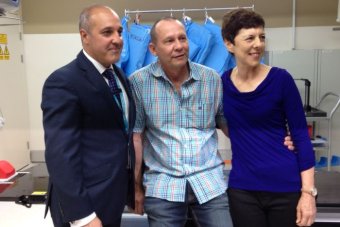Nearly 2,000 Queenslanders with cancer will have access to independent clinical trials, thanks to new funding worth $7 million over five years.
The funds, from Queensland Health and Cancer Council Queensland, pave the way for 1,850 patients to take part in trials treating more than 12 types of cancer, including breast, skin, pancreatic, ovarian, prostate, lung, bowel, cervical and cancers affecting children.
Clinical trials improve health outcomes, save costs on the health system, and ultimately save lives by increasing the effectiveness of cancer treatment
Professor Jeff Dunn, Cancer Council Queensland CEO
Health Minister Cameron Dick said part of the money would be used to fund data managers.
“They help identify patients who may wish to be involved in clinical trials,” he said.
“They link those patients with researchers who are doing leading work in relation to cancer treatment, and then they help record the data.”
Cancer Council Queensland chief executive Professor Jeff Dunn said cancer clinical trials were one of the most important means of developing new and better treatments.
“Clinical trials improve health outcomes, save costs on the health system, and ultimately save lives by increasing the effectiveness of cancer treatment,” Professor Dunn said.
“This funding commitment will ensure that eligible patients diagnosed with cancer in Queensland are offered the opportunity to participate in life-saving investigations.
“Clinical trials have an impact across the whole continuum of cancer care, including cancer prevention, screening, treatment, follow-up and, most importantly, improved cancer survival.”
Trials provide ‘the best treatment’
The first thought to go through Arthur Davis’s mind when he was diagnosed with cancer was “am I going to live?”.
The father of three was diagnosed with a tumour on his tonsils 18 months ago and underwent chemotherapy and radiation, but at a lower dose than usual.

It was part of a clinical trial, one aimed at reducing the toxicity of cancer treatments.
“In Arthur’s case he was involved in a trial that looked at de-escalating or reducing the dose of the chemotherapy to lessen the side effects,” Mr Davis’s oncologist, Dr Sandro Porceddu, said.
“If we can deliver them treatments that have fewer side effects, they’ll recover quicker and get back to work, like Arthur has done.”
Mr Davis’s advice to others considering going on clinical trials: “Go for it.”
“You get the best treatment I think. You know, they treat me like a king here,” he said.
